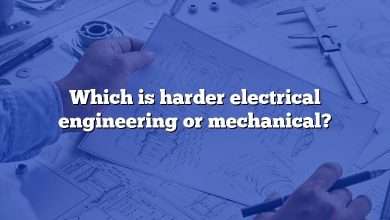The fields of electrical engineering (EE) and electrical engineering technology (EET) offer rewarding career paths for those interested in working with electrical systems and devices. While both disciplines share a foundation in electrical principles, they differ significantly in terms of education, job roles, and focus. This comprehensive guide aims to help you understand the key differences between EE and EET, allowing you to make an informed decision about which path aligns best with your interests and goals.
Key Takeaways
- Electrical engineering (EE) focuses on the research, design, and development of electrical systems and devices, while electrical engineering technology (EET) emphasizes the installation, maintenance, and repair of these systems.
- EE professionals require a strong foundation in mathematics and physics, while EET professionals need hands-on experience and practical skills.
- Earning potential and career advancement opportunities tend to be higher for electrical engineers, but both fields offer competitive salaries and job prospects.
- Electrical engineers and EET professionals can enhance their careers through professional associations, certifications, and continuous learning.
Electrical Engineering Technology vs Electrical Engineering
Electrical Engineering Technology (EET) and Electrical Engineering (EE) are two closely related fields that often get mistaken for one another. While they share a common foundation in electrical principles and applications, they have some distinct differences in terms of education, job roles, and career prospects. This article will provide an in-depth comparison of these two fields, helping you make an informed decision about which path to choose.
Educational Requirements
Both EET and EE programs require a strong foundation in mathematics and sciences but differ in focus and depth.
Electrical Engineering Technology (EET)
- EET programs typically lead to an associate’s or bachelor’s degree.
- The curriculum focuses on applied learning and hands-on experience, preparing graduates for practical roles in the field.
- Core courses may include circuit analysis, digital electronics, control systems, and electromechanical devices.
- Students gain experience in using industry-standard tools and equipment, as well as troubleshooting and repair techniques.
Electrical Engineering (EE)
- EE programs usually lead to a bachelor’s, master’s, or doctoral degree.
- The curriculum emphasizes theoretical knowledge and advanced math, preparing graduates for research, design, and development roles.
- Core courses may include advanced mathematics, electromagnetic theory, signal processing, and microelectronics.
- Students typically engage in research projects and internships, gaining experience in design and problem-solving.
Job Roles and Responsibilities
While there is some overlap in the roles and responsibilities of EET and EE professionals, they generally have different areas of focus.
Electrical Engineering Technology (EET)
- EET professionals often work as technicians, technologists, or engineering assistants.
- Their work is typically focused on the installation, maintenance, and repair of electrical systems and devices.
- They may work in industries such as manufacturing, power generation, and telecommunications.
- EET professionals usually work under the supervision of electrical engineers, helping to implement designs and troubleshoot issues.
Electrical Engineering (EE)
- EE professionals typically work as electrical engineers, specializing in areas like power systems, electronics, or telecommunications.
- Their work involves designing, developing, and testing electrical systems and devices to meet specific performance requirements.
- They may work in industries such as aerospace, automotive, and consumer electronics.
- EE professionals often lead teams of technicians and technologists, overseeing the implementation of their designs and providing technical guidance.
Salary and Career Prospects
Both EET and EE professionals can expect competitive salaries and strong demand for their skills. However, the earning potential and career advancement opportunities tend to be higher for electrical engineers.
Electrical Engineering Technology (EET)
- According to the U.S. Bureau of Labor Statistics (BLS), the median annual wage for electrical and electronics engineering technicians was $67,550 in 2020.
- Job growth for electrical and electronics engineering technicians is projected to be 2% from 2020 to 2030, which is slower than the average for all occupations.
- EET professionals may advance their careers by obtaining certifications, specializing in specific industries or technologies, or pursuing a higher degree in electrical engineering.
Electrical Engineering (EE)
- According to the BLS, the median annual wage for electrical engineers was $101,600 in 2020.
- Job growth for electrical engineers is projected to be 5% from 2020 to 2030, which is faster than the average for all occupations.
- EE professionals can advance their careers by specializing in high-demand areas, obtaining professional engineer (PE) licensure, or pursuing managerial or academic roles.
Skill Sets and Competencies
While there is some overlap in the skills required for EET and EE professionals, their areas of expertise tend to differ.
Electrical Engineering Technology (EET)
- EET professionals should possess strong problem-solving skills and a keen attention to detail, as they often work with complex electrical systems and devices.
- They should be proficient in the use of diagnostic tools and equipment, as well as in soldering and other hands-on techniques.
- Familiarity with industry-specific software and programming languages, such as PLC programming or AutoCAD, can be beneficial.
- Strong communication and teamwork skills are essential, as EET professionals often collaborate with engineers and other technicians.
Electrical Engineering (EE)
- EE professionals should have a strong foundation in mathematics and physics, as well as a deep understanding of electrical theory and principles.
- They should be skilled in computer-aided design (CAD) software, simulation tools, and programming languages, such as C++ or MATLAB, for designing and testing electrical systems and devices.
- Strong analytical and critical thinking skills are important, as EE professionals often need to devise innovative solutions to complex problems.
- Excellent communication and leadership skills are essential, as electrical engineers often collaborate with multidisciplinary teams and may manage projects or personnel.
Professional Associations and Certifications
Both EET and EE professionals can benefit from joining professional associations and obtaining certifications to enhance their skills and career prospects.
Electrical Engineering Technology (EET)
- The National Institute for Certification in Engineering Technologies (NICET) offers certifications for electrical and electronics engineering technicians, which can demonstrate expertise and commitment to professional development.
- The Electronics Technicians Association (ETA) provides certifications in areas such as electronics, fiber optics, and renewable energy.
- The Institute of Electrical and Electronics Engineers (IEEE) is a global professional organization that offers resources, networking opportunities, and continuing education for both EET and EE professionals.
Electrical Engineering (EE)
- The National Society of Professional Engineers (NSPE) offers the Professional Engineer (PE) licensure, which demonstrates a high level of competence and ethical practice in the engineering profession.
- The IEEE also provides certifications in specialized areas such as power systems, communications, and software development, among others.
- Professional organizations like the Institution of Engineering and Technology (IET) or the International Society of Automation (ISA) offer additional resources and certifications for electrical engineers in specific industries or technologies.
FAQ: Electrical Engineering Technology vs Electrical Engineering
1. Which is better: electrical engineering or electrical engineering technology?
It is difficult to label one field as better than the other, as both electrical engineering and electrical engineering technology have their own unique advantages and challenges. The better choice depends on your personal interests, strengths, and career goals. If you are more interested in hands-on work, troubleshooting, and maintaining electrical systems, EET may be the better fit for you. On the other hand, if you are passionate about theoretical concepts, research, and design, EE might be the more suitable choice.
In terms of salary and career prospects, electrical engineers tend to have higher earning potential and more opportunities for advancement. However, both fields are in demand and offer competitive salaries. Ultimately, the decision between EE and EET should be based on your individual preferences and aspirations, rather than which is perceived as “better.”
2. What is the difference between engineering and engineering technology?
Engineering and engineering technology are related fields, but they have some distinct differences in terms of education, focus, and job roles. Engineering programs typically emphasize theoretical knowledge, advanced mathematics, and scientific principles, preparing graduates for research, design, and development roles. Engineering professionals often work on creating new technologies, devising innovative solutions, and designing complex systems.
Engineering technology programs, on the other hand, focus on applied learning, hands-on experience, and practical skills. Graduates are prepared for roles that involve the installation, maintenance, and repair of existing systems and devices. Engineering technologists work closely with engineers, often helping to implement designs and troubleshoot issues. While both fields require a strong foundation in math and science, engineering tends to be more theory-intensive, whereas engineering technology is more application-oriented.
3. What is the work of electrical engineering technology?
Electrical engineering technology professionals work in a variety of industries, such as manufacturing, power generation, and telecommunications. Their primary responsibilities involve the installation, maintenance, and repair of electrical systems and devices. They often work with electrical engineers to implement designs, troubleshoot issues, and ensure the smooth operation of electrical systems.
EET professionals may also be involved in testing and quality control, ensuring that electrical components and systems meet industry standards and safety regulations. They typically use a range of diagnostic tools and equipment to identify and resolve issues. Additionally, EET professionals may be responsible for training and supervising less experienced technicians, as well as staying up-to-date on the latest industry trends and technologies.
4. What is the difference between electrical technology and electronic technology?
While the terms “electrical technology” and “electronic technology” are often used interchangeably, they refer to distinct aspects of the broader field of electrical engineering. Electrical technology primarily focuses on the generation, transmission, distribution, and utilization of electric power. This includes working with high-voltage power systems, electrical machines, and power electronics.
Electronic technology, on the other hand, deals with the design, development, and application of electronic devices and circuits. This typically involves working with low-voltage systems, such as integrated circuits, microprocessors, and digital communication systems. Both fields share a common foundation in electrical principles and applications, but electronic technology is more concerned with the control and manipulation of electrical signals, whereas electrical technology deals with the broader aspects of electrical power.
5. What are some examples of electrical technology?
Electrical technology encompasses a wide range of devices, systems, and applications that involve the generation, transmission, and utilization of electric power. Some examples include:
- Power generation systems, such as hydroelectric dams, nuclear power plants, and solar panels
- Transmission and distribution networks, including transformers, substations, and high-voltage power lines
- Electrical machines, such as motors, generators, and transformers
- Power electronics, including inverters, converters, and rectifiers, which are used to control and convert electrical energy
- Electrical protection systems, such as circuit breakers, fuses, and surge protectors, which safeguard electrical equipment from damage due to faults or overloads
- Energy management systems and smart grids, which optimize the generation, distribution, and consumption of electricity through advanced monitoring and control technologies.
6. Is electrical engineering technology the same as computer science?
Electrical engineering technology and computer science are distinct fields, although they do share some overlap in certain areas. Electrical engineering technology focuses on the practical aspects of electrical systems and devices, including installation, maintenance, and repair. EET professionals typically work with electrical engineers to implement designs and troubleshoot issues in various industries, such as manufacturing, power generation, and telecommunications.
Computer science, on the other hand, is a field that deals with the theory, design, and implementation of computer systems and software. It involves the study of algorithms, data structures, programming languages, and other computational principles. While there is some crossover in areas such as digital electronics, embedded systems, and computer networking, electrical engineering technology and computer science are separate fields with different educational requirements, job roles, and career paths.
7. What is the hardest field in electrical engineering?
The difficulty of a specific field within electrical engineering can be subjective, as it depends on individual interests, strengths, and educational backgrounds. Some may find power systems and high-voltage engineering challenging due to the complex mathematical and physical concepts involved. Others may find fields such as signal processing, control systems, or semiconductor materials to be more difficult due to their highly specialized nature and the need for advanced mathematical skills.
It’s important to remember that the perceived difficulty of a field should not deter you from pursuing it if it genuinely interests you. With dedication, persistence, and a strong foundation in mathematics and physics, you can overcome the challenges and succeed in your chosen area of electrical engineering.
8. What are the benefits of electrical technology?
Electrical technology offers numerous benefits for both individuals and society as a whole. Some of these benefits include:
- Efficient utilization of energy resources: Electrical technology enables the efficient generation, transmission, and distribution of electricity, which is essential for modern life and economic development.
- Enhanced safety and reliability: Electrical technology helps ensure the safe and reliable operation of electrical systems and devices, reducing the risk of accidents and power outages.
- Innovation and technological advancements: Electrical technology drives innovation in various industries, leading to the development of new products, systems, and solutions that improve our daily lives and contribute to environmental sustainability.
- Diverse career opportunities: A background in electrical technology can open doors to a wide range of rewarding careers in industries such as manufacturing, power generation, telecommunications, and transportation.
- Personal growth and satisfaction: Pursuing a career in electrical technology can be intellectually stimulating and challenging, offering opportunities for continuous learning, problem-solving, and professional growth.
9. Do electrical engineers make technology?
Electrical engineers play a crucial role in the development of new technologies and the advancement of existing ones. They design, develop, test, and improve electrical systems and devices, often working at the forefront of cutting-edge research and development projects. This can involve creating new products, optimizing existing systems, or devising innovative solutions to complex problems.
Some examples of technology created or improved by electrical engineers include power generation systems, renewable energy technologies, communication networks, and electronic devices. By working in collaboration with other engineers, scientists, and professionals, electrical engineers contribute significantly to the technological advancements that shape our modern world.
10. Can electrical engineering technology professionals become engineers?
It is possible for electrical engineering technology professionals to transition to engineering roles, although this typically requires additional education and training. In most cases, an EET graduate would need to obtain a bachelor’s degree in electrical engineering or a related field to be considered for engineering positions. This may involve completing additional coursework in advanced mathematics, physics, and engineering theory.
In some cases, work experience as an EET professional, along with a strong portfolio of projects, may be sufficient for employers to consider candidates for engineering roles. However, pursuing a formal engineering degree will likely provide more opportunities and a higher earning potential. Additionally, obtaining a Professional Engineer (PE) license, which requires a bachelor’s degree in engineering and relevant work experience, can further enhance career prospects and credibility in the field.
11. How do electrical engineering and electrical engineering technology programs differ in terms of coursework?
While both electrical engineering and electrical engineering technology programs share a foundation in electrical principles and applications, they differ in terms of coursework emphasis and focus. Electrical engineering programs typically involve more advanced mathematics, such as calculus, differential equations, and linear algebra. They also cover more in-depth theoretical topics, such as electromagnetism, control systems, and signal processing.
Electrical engineering technology programs, on the other hand, place more emphasis on hands-on learning and practical skills. Coursework may include topics such as electrical circuits, instrumentation, and industrial controls, with a focus on applying these concepts to real-world situations. While EET programs still require math and science courses, the level of mathematical rigor is generally lower compared to EE programs.
12. What are the primary industries where electrical engineering technology professionals work?
Electrical engineering technology professionals can find employment in a diverse range of industries, as their skills are applicable to various sectors that rely on electrical systems and devices. Some primary industries where EET professionals work include:
- Manufacturing: EET professionals are often involved in the installation, maintenance, and repair of electrical equipment and systems in manufacturing facilities.
- Power generation and distribution: EET professionals work in power plants, substations, and other facilities that generate, transmit, and distribute electricity.
- Telecommunications: EET professionals help maintain and troubleshoot communication networks, such as fiber optic systems, cellular networks, and satellite systems.
- Transportation: EET professionals work on electrical systems for vehicles, including automobiles, trains, and aircraft, as well as transportation infrastructure, such as traffic signal systems and electrified railways.
- Renewable energy: EET professionals are involved in the installation, maintenance, and optimization of renewable energy systems, such as solar panels, wind turbines, and energy storage devices.
These are just a few examples of the industries where electrical engineering technology professionals can find rewarding careers. As technology continues to advance and the demand for skilled professionals grows, EET professionals will continue to play a vital role in maintaining and improving the electrical systems that power our modern world.
Conclusion
The decision to pursue a career in electrical engineering or electrical engineering technology ultimately depends on your personal interests, strengths, and goals. Electrical engineering offers a more research and design-oriented path, with a focus on theoretical knowledge and the development of cutting-edge technologies. In contrast, electrical engineering technology emphasizes practical, hands-on work in the installation, maintenance, and repair of electrical systems.
By understanding the differences between these two fields in terms of education, job roles, salary, and skill sets, you can make a well-informed decision about which path is best suited for you. Regardless of the path you choose, both electrical engineering and electrical engineering technology offer rewarding careers that contribute to technological advancements and the betterment of society as a whole.








